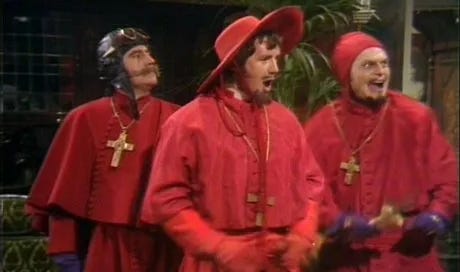Some people claim the deuterocanonical books shouldn’t be included in the Bible because the New Testament “doesn’t refer to them.” This is untrue, and today’s readings are a pretty clear example.
The disciples ask Jesus why Elijah must come before the messiah, according to a prophesy in Malachi.1 But our first reading, from the deuterocanonical Sirach, also confirms the same prophesy, indicating that they’re working from the same set of beliefs.
Reading 1
Sir 48:1-4, 9-11
In those days, like a fire there appeared the prophet Elijah whose words were as a flaming furnace. Their staff of bread he shattered, in his zeal he reduced them to straits; By the Lord's word he shut up the heavens and three times brought down fire. How awesome are you, Elijah, in your wondrous deeds! Whose glory is equal to yours? You were taken aloft in a whirlwind of fire, in a chariot with fiery horses. You were destined, it is written, in time to come to put an end to wrath before the day of the LORD, To turn back the hearts of fathers toward their sons, and to re-establish the tribes of Jacob. Blessed is he who shall have seen you and who falls asleep in your friendship.
The prophet Elijah’s fiery preaching and wondrous deeds had one aim: “to put an end to wrath before the day of the Lord.” He wasn’t bringing down fire to punish people; he wanted them to be ready for the Messiah. It was tough love. He calls for repentance so things don’t go much worse for us in the end.
Responsorial Psalm
Ps 80:2ac and 3b, 15-16, 18-19
R. Lord, make us turn to you; let us see your face and we shall be saved.
O shepherd of Israel, hearken,
From your throne upon the cherubim, shine forth.
Rouse your power.
R. Lord, make us turn to you; let us see your face and we shall be saved.
Once again, O LORD of hosts,
look down from heaven, and see;
Take care of this vine,
and protect what your right hand has planted
the son of man whom you yourself made strong.
R. Lord, make us turn to you; let us see your face and we shall be saved.
May your help be with the man of your right hand,
with the son of man whom you yourself made strong.
Then we will no more withdraw from you;
give us new life, and we will call upon your name.
R. Lord, make us turn to you; let us see your face and we shall be saved.
This was a song sung after a military defeat. The Israelites are calling out for a military leader to exact revenge. But that’s not who the Son of Man is. Elijah may come first, raining down fire, but the Messiah is a Prince of Peace.
Alleluia
Lk 3:4, 6
R. Alleluia, alleluia.
Prepare the way of the Lord, make straight his paths:
All flesh shall see the salvation of God.
R. Alleluia, alleluia.
This is John the Baptist quoting Elijah. He knows his role.
Gospel
Mt 17:9a, 10-13
As they were coming down from the mountain, the disciples asked Jesus, "Why do the scribes say that Elijah must come first?"
He said in reply, "Elijah will indeed come and restore all things; but I tell you that Elijah has already come, and they did not recognize him but did to him whatever they pleased. So also will the Son of Man suffer at their hands."
Then the disciples understood that he was speaking to them of John the Baptist.
It’s possible that this question and answer reflects a controversy among Jews who objected to Jesus’ messianic claims, because Elijah had not yet come. Jesus clarifies that it’s not literally Elijah, but one who is very much like him, i.e. John the Baptist.
Moreover, their lack of recognition is foreshadowing for them not recognizing Jesus Himself. Just as John was executed, so will Jesus be.



